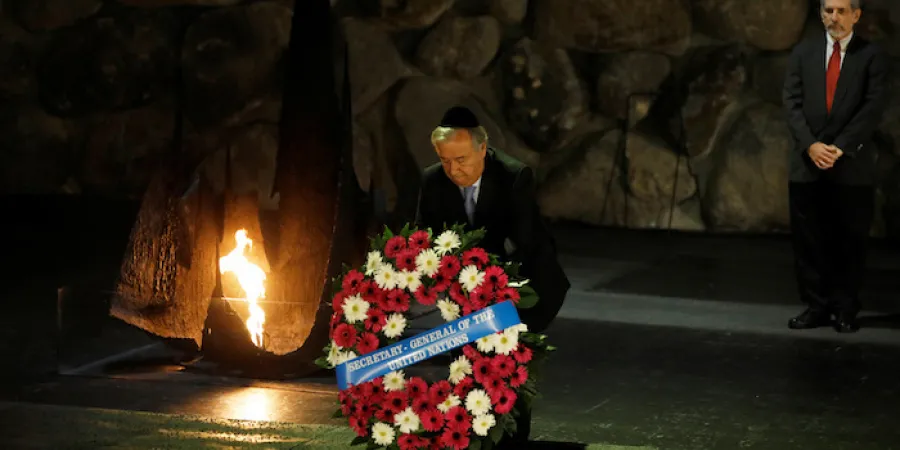UN calls on social media companies to combat Holocaust denial
In a resolution condemning Holocaust denial, member states expressed concern over increasing denial and distortion through information and communication technologies
Mandi Kogosowski
| 24/01/2022
the UN General Assembly adopted a resolution on the definition and condemnation of Holocaust denial, which urges social media companies to take active measures in combatting antisemitism and Holocaust denial and distortion by means of information and communications technologies.
In the resolution’s text, member states expressed concern over the “growing prevalence of Holocaust denial or distortion through the use of information and communications technologies”, and noted the global and open nature of the internet and the significant role of social media in spreading information.
Yet, the member states also mentioned that social media has the potential to play a “positive role in the preservation of the memory of the Holocaust, promoting historically accurate Holocaust education and countering Holocaust denial and distortion”.
“We now live in an era in which fiction is becoming fact and the Holocaust is becoming a distant memory,” said Israel’s UN ambassador Gilad Erdan at the special session, noting that social media platforms are “spreading the pandemic of distortions and lies” about the Holocaust.
“Social media giants can no longer remain complacent to the hate spread on their platforms,” said Erdan.
Holocaust denial flourishes online
In October 2020, Facebook announced it had updated its policy on hate speech to “prohibit any content that denies or distorts the Holocaust.” This decision was supported by “the well-documented rise in anti-Semitism globally and the alarming level of ignorance about the Holocaust, especially among young people,” according to the company’s official statement.
Facebook’s updated policy (two years after CEO Mark Zuckerberg created an uproar after saying he didn’t believe the company should remove such posts) followed its decision to ban antisemitic stereotypes “about the collective power of Jews that often depicts them running the world or its major institutions.” Two days later, Twitter also announced that it will ban Holocaust denial posts.
In January 2021 UNESCO and the World Jewish Congress reached an agreement with Facebook to redirect users searching for terms related to the Holocaust or Holocaust denial to the website AboutHolocaust.org, which provide factual answers to fundamental questions about the Holocaust.
And yet, Holocaust denial and antisemitism continue to flourish on social media. The Anti-Defamation League (ADL) noted in a December 2021 report that “While dedicated groups have been removed and one search term limited, Holocaust denial content remains on the platform.”
“These are located in public and private groups as well as on personal profiles, and many contain links to external, explicit Holocaust denial sources,” says the report, noting that while “Facebook has taken some positive steps to address its Holocaust denial problem,” additional measures are required in order to improve enforcement.
Recommendations include expanding the language parameter in order to further detect Holocaust denial (including the development of sophisticated machine learning techniques), and seeking expert reviews of content moderation training materials.
In a resolution condemning Holocaust denial, member states expressed concern over increasing denial and distortion through information and communication technologies
the UN General Assembly adopted a resolution on the definition and condemnation of Holocaust denial, which urges social media companies to take active measures in combatting antisemitism and Holocaust denial and distortion by means of information and communications technologies.
In the resolution’s text, member states expressed concern over the “growing prevalence of Holocaust denial or distortion through the use of information and communications technologies”, and noted the global and open nature of the internet and the significant role of social media in spreading information.
Yet, the member states also mentioned that social media has the potential to play a “positive role in the preservation of the memory of the Holocaust, promoting historically accurate Holocaust education and countering Holocaust denial and distortion”.
“We now live in an era in which fiction is becoming fact and the Holocaust is becoming a distant memory,” said Israel’s UN ambassador Gilad Erdan at the special session, noting that social media platforms are “spreading the pandemic of distortions and lies” about the Holocaust.
“Social media giants can no longer remain complacent to the hate spread on their platforms,” said Erdan.
Holocaust denial flourishes online
In October 2020, Facebook announced it had updated its policy on hate speech to “prohibit any content that denies or distorts the Holocaust.” This decision was supported by “the well-documented rise in anti-Semitism globally and the alarming level of ignorance about the Holocaust, especially among young people,” according to the company’s official statement.
Facebook’s updated policy (two years after CEO Mark Zuckerberg created an uproar after saying he didn’t believe the company should remove such posts) followed its decision to ban antisemitic stereotypes “about the collective power of Jews that often depicts them running the world or its major institutions.” Two days later, Twitter also announced that it will ban Holocaust denial posts.
In January 2021 UNESCO and the World Jewish Congress reached an agreement with Facebook to redirect users searching for terms related to the Holocaust or Holocaust denial to the website AboutHolocaust.org, which provide factual answers to fundamental questions about the Holocaust.
And yet, Holocaust denial and antisemitism continue to flourish on social media. The Anti-Defamation League (ADL) noted in a December 2021 report that “While dedicated groups have been removed and one search term limited, Holocaust denial content remains on the platform.”
“These are located in public and private groups as well as on personal profiles, and many contain links to external, explicit Holocaust denial sources,” says the report, noting that while “Facebook has taken some positive steps to address its Holocaust denial problem,” additional measures are required in order to improve enforcement.
Recommendations include expanding the language parameter in order to further detect Holocaust denial (including the development of sophisticated machine learning techniques), and seeking expert reviews of content moderation training materials.



